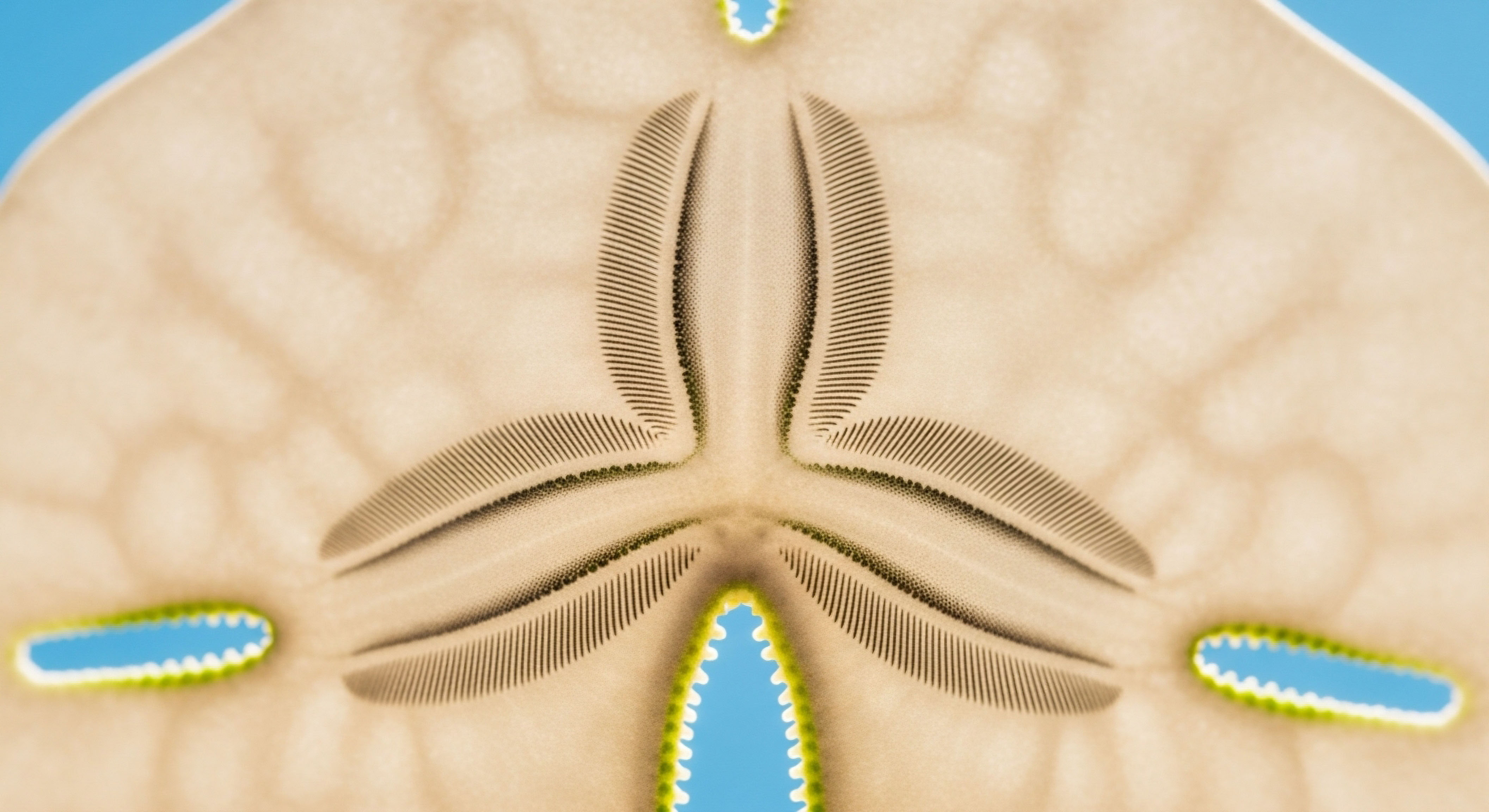


Fundamentals
Have you ever felt a subtle shift within your physical being, a quiet diminishment of the vitality that once defined your days? Perhaps a persistent fatigue, a recalcitrant weight gain, or a sense that your body’s internal rhythms are simply out of sync. These experiences are not merely isolated incidents; they often signal a deeper conversation occurring within your endocrine system, the intricate network of glands and hormones that orchestrates nearly every biological process. Understanding these subtle cues, these whispers from your own physiology, marks the initial step toward reclaiming optimal function.
Our bodies possess an extraordinary capacity for self-regulation, a complex symphony of biochemical signals. Among the most compelling of these signals are peptides, short chains of amino acids that act as precise messengers, guiding cellular activities and influencing everything from metabolic rate to tissue repair. When we consider supporting our biological systems, particularly when seeking to restore hormonal equilibrium or enhance recovery, peptides frequently enter the discussion. Their targeted actions hold significant promise for addressing a spectrum of health concerns.
Peptides function as the body’s precise internal messengers, orchestrating cellular activities and influencing vital biological processes.
For any novel therapeutic agent, including peptides, to become a recognized part of a wellness protocol, it must undergo rigorous evaluation. This is especially true in a highly regulated environment like China, where the National Medical Products Administration (NMPA) serves as the gatekeeper for pharmaceutical products. The NMPA’s oversight ensures that any new compound, whether a small molecule or a complex biological product like a peptide, meets stringent safety and efficacy standards before it can be considered for broader application. This regulatory framework protects public health and establishes a foundation of trust in new medical interventions.
The journey of a peptide from scientific discovery to clinical availability is a meticulous process, demanding comprehensive investigation. This process involves a series of structured investigations designed to confirm a compound’s safety profile and its ability to elicit the desired biological effects. For individuals seeking to optimize their hormonal health or metabolic function, comprehending this rigorous path provides assurance that potential solutions are grounded in verifiable science. It speaks to a commitment to scientific integrity, ensuring that personalized wellness protocols are built upon a foundation of validated understanding.


What Is the Purpose of Clinical Trials for Peptides?
Clinical trials serve as the scientific crucible for new therapeutic agents. For peptides, these investigations are designed to systematically evaluate their biological impact within human systems. The primary objectives revolve around establishing both the safety and the efficacy of the compound.
Safety assessments aim to identify any adverse reactions or unintended physiological responses, ensuring that the potential benefits outweigh any risks. Efficacy evaluations, conversely, measure the peptide’s ability to produce the intended therapeutic effect, whether that involves modulating hormonal pathways, promoting tissue regeneration, or influencing metabolic markers.
Beyond these core objectives, clinical trials also gather crucial data on optimal dosing, administration routes, and potential interactions with other biological systems. This comprehensive data collection allows clinicians to develop precise protocols, tailoring interventions to individual physiological needs. For those considering peptide therapy as part of a personalized wellness strategy, understanding the depth of this evaluative process reinforces the evidence-based nature of such approaches. It underscores the scientific rigor that underpins the development of these targeted biochemical tools.



Intermediate
When considering advanced strategies for hormonal optimization or metabolic recalibration, specific peptide protocols frequently arise. Compounds like Sermorelin, Ipamorelin / CJC-1295, and Tesamorelin are often discussed for their roles in modulating growth hormone secretion, aiming to support anti-aging objectives, muscle protein synthesis, adipose tissue reduction, and sleep quality enhancement. Similarly, PT-141 is recognized for its potential influence on sexual health pathways, while Pentadeca Arginate (PDA) holds promise for tissue repair and inflammation modulation. Each of these agents, when considered for clinical application, must navigate a defined pathway of regulatory scrutiny, particularly within China’s evolving pharmaceutical landscape.
The NMPA categorizes drugs, including peptides, into broad classifications such as chemical medicines and biological products. This classification significantly influences the specific clinical trial application and review process. Peptides, given their biological origin and complex structures, often fall under the biological products category, necessitating a distinct set of regulatory considerations.
The NMPA has also adopted guidelines from the International Council for Harmonization (ICH), signaling a move toward global alignment in regulatory standards. This harmonization simplifies the process for international developers, yet local adaptations remain vital.
China’s NMPA aligns with international guidelines while requiring local adaptations for clinical trials, particularly for biological products like peptides.


What Are the Stages of Peptide Clinical Trials in China?
Clinical trials in China, consistent with global standards, are typically divided into three sequential phases, each with distinct objectives and requirements:
- Phase I Trials ∞ These initial investigations focus primarily on safety and tolerability. A small group of healthy volunteers receives the peptide to assess its pharmacokinetic profile ∞ how the body absorbs, distributes, metabolizes, and eliminates the compound ∞ and to identify any immediate adverse reactions. This phase establishes a safe dosing range for subsequent studies.
- Phase II Trials ∞ Moving beyond basic safety, Phase II studies evaluate the peptide’s efficacy in a larger cohort of patients who exhibit the target condition. These trials also continue to monitor safety, refining the understanding of potential side effects and optimal dosages. The goal is to determine if the peptide shows sufficient promise to proceed to broader evaluation.
- Phase III Trials ∞ This extensive phase involves a large number of patients, often across multiple clinical sites. The primary objective is to confirm the peptide’s efficacy and safety profile on a much grander scale, comparing it against existing treatments or a placebo. Successful completion of Phase III trials typically forms the basis for a marketing authorization application.
Beyond these core phases, a crucial preliminary step involves submitting an Investigational New Drug (IND) application to the NMPA’s Center for Drug Evaluation (CDE). This application requires comprehensive preclinical data, including toxicology studies and pharmacological profiles, to justify human administration. Recent NMPA reforms have reduced the review time for INDs for innovative medicines, aiming to accelerate the availability of novel therapies.


How Does Regulatory Communication Shape Peptide Development?
Effective communication with the NMPA’s CDE is a cornerstone of successful peptide development in China. Before submitting a formal clinical trial application, applicants are often required to request communication meetings with the CDE. These meetings serve to discuss the integrity of the clinical trial data, the feasibility of the proposed trial design, and to align on regulatory expectations. This proactive engagement helps to mitigate potential delays and ensures that the research protocol aligns with the NMPA’s specific requirements.
Any substantial changes to a clinical trial protocol during its execution also necessitate regulatory communication and, in many cases, re-approval. This meticulous oversight ensures that the integrity of the study is maintained and that patient safety remains paramount throughout the research process. The NMPA’s emphasis on adherence to Good Clinical Practice (GCP) standards is non-negotiable, encompassing aspects from informed consent procedures to data management and reporting.
| Phase | Primary Objective | Participant Group | Key Considerations |
|---|---|---|---|
| Phase I | Safety and Tolerability | Small group of healthy volunteers | Pharmacokinetics, initial adverse event profile, safe dosing range. |
| Phase II | Efficacy and Continued Safety | Larger group of patients with target condition | Dose-response, preliminary efficacy, further safety monitoring. |
| Phase III | Confirmatory Efficacy and Safety | Large, diverse patient population | Comparison to standard care, long-term safety, pivotal data for marketing. |
Academic
The regulatory landscape governing clinical trials for peptides in China is a sophisticated system, meticulously designed to ensure both scientific rigor and public safety. The National Medical Products Administration (NMPA) stands as the central authority, orchestrating the entire lifecycle of pharmaceutical products, from investigational new drug (IND) applications through post-market surveillance. For peptides, which often represent innovative biological entities, the requirements extend beyond general drug development guidelines, demanding a deep understanding of their unique biochemical properties and therapeutic mechanisms.
A critical aspect of the NMPA’s framework is its emphasis on Good Clinical Practice (GCP). This international ethical and scientific quality standard for designing, conducting, recording, and reporting trials involving human subjects is strictly enforced in China. Adherence to GCP ensures the protection of the rights, safety, and well-being of trial participants, while also guaranteeing the credibility of the clinical data generated. This includes rigorous protocols for informed consent, ensuring that all subjects or their legal representatives fully comprehend the nature, risks, and benefits of participation before enrollment.
NMPA’s strict adherence to Good Clinical Practice (GCP) standards ensures ethical conduct and data integrity in peptide clinical trials.


What Preclinical Data Is Required for Peptide IND Applications?
Before any peptide can be administered to human subjects in a clinical trial, a comprehensive dossier of preclinical data must be compiled and submitted as part of the IND application. This foundational data provides the NMPA with an initial assessment of the peptide’s potential safety and pharmacological activity. Key preclinical requirements typically include:
- Pharmacology Studies ∞ These investigations characterize the peptide’s mechanism of action, its target receptors, and its specific biological effects in relevant in vitro and in vivo models. This includes studies on dose-response relationships and selectivity.
- Toxicology Studies ∞ A series of toxicology assessments are essential to identify potential adverse effects. This encompasses acute toxicity, subchronic toxicity, and chronic toxicity studies in at least two animal species, one of which must be a non-rodent. Genotoxicity and reproductive toxicity studies may also be required depending on the peptide’s intended use and duration of administration.
- Pharmacokinetics and Pharmacodynamics (PK/PD) ∞ These studies describe how the peptide is absorbed, distributed, metabolized, and excreted by the body (PK), and how it exerts its effects at various concentrations (PD). Understanding the PK/PD profile is crucial for determining appropriate human dosing and administration schedules.
- Manufacturing and Quality Control (CMC) ∞ Detailed information on the peptide’s manufacturing process, purity, stability, and quality control measures is mandatory. This ensures consistency and reliability of the investigational product used in clinical trials.
The NMPA’s Center for Drug Evaluation (CDE) conducts a thorough preliminary review of this preclinical information, often requiring communication meetings with the applicant to clarify data integrity and trial feasibility. This early engagement is vital for navigating the regulatory pathway efficiently.


How Do NMPA Inspections Influence Peptide Clinical Trials?
Beyond the initial application and ongoing data submission, NMPA conducts rigorous inspections of clinical trial institutions and manufacturing facilities. These inspections are designed to verify compliance with GCP and Good Manufacturing Practice (GMP) standards. For manufacturing sites, this includes detailed assessments of raw material quality, the production process, and quality control systems. The NMPA’s “Inspection Checkpoints and Judging Principles for Clinical Trial,” published in March 2025, provides specific guidance on what inspectors will evaluate, signaling a heightened level of oversight.
Clinical trial institutions must be appropriately qualified and registered, with main investigators for innovative or Class III medical devices possessing senior titles and extensive experience. These requirements underscore China’s commitment to high-quality research. The NMPA also requires clinical data to be representative of the Chinese population, which may necessitate specific adaptations to trial protocols or the inclusion of local cohorts, even for globally developed peptides. This ensures the applicability of findings to the target demographic within China.
| Regulatory Body/Document | Primary Role/Focus | Relevance to Peptides |
|---|---|---|
| National Medical Products Administration (NMPA) | Overall regulatory authority for drugs, medical devices, cosmetics in China. | Approves INDs, marketing authorizations, oversees GCP/GMP compliance. |
| Center for Drug Evaluation (CDE) | Evaluates drug clinical trial applications and marketing authorization applications. | Conducts preliminary reviews, holds communication meetings with applicants. |
| Good Clinical Practice (GCP) Guidelines | International ethical and scientific quality standard for human trials. | Mandatory for all clinical trials in China, ensures data integrity and participant safety. |
| Good Manufacturing Practice (GMP) Standards | Quality assurance system for manufacturing and control of pharmaceutical products. | Required for facilities producing investigational peptides for trials and commercial products. |
The evolving nature of China’s regulatory environment, characterized by continuous updates to guidelines and increased harmonization with international standards, presents both opportunities and complexities for peptide developers. Successfully navigating this system requires not only robust scientific data but also a strategic understanding of the NMPA’s specific expectations and a commitment to local collaboration. This rigorous process ultimately serves to validate the therapeutic potential of peptides, ensuring that these targeted biochemical tools can safely and effectively contribute to personalized wellness protocols.
References
- Chen, Y. & Zhang, L. (2023). Regulatory Framework for Innovative Drugs in China ∞ A Comprehensive Guide. Science Press.
- Wang, H. & Li, J. (2024). Clinical Trial Design and Management in Emerging Markets. Medical Publishing House.
- Liu, X. & Sun, M. (2022). Peptide Therapeutics ∞ From Discovery to Clinical Application. Academic Press.
- Zhang, P. & Guo, Q. (2023). Good Clinical Practice in Asia ∞ A Comparative Analysis. Springer.
- Zhao, R. & Wu, T. (2021). Pharmacology and Toxicology of Biologics. Elsevier.
- International Council for Harmonisation of Technical Requirements for Pharmaceuticals for Human Use (ICH). (2016). ICH Harmonised Guideline ∞ Integrated Addendum to ICH E6(R1) ∞ Guideline for Good Clinical Practice E6(R2).
- National Medical Products Administration (NMPA) of China. (2025). Inspection Checkpoints and Judging Principles for Clinical Trial (Trial Version). (Internal Publication).
- National Medical Products Administration (NMPA) of China. (2024). Measures for Supervision and Inspection of Medical Device Clinical Trial Institutions (Trial). (Internal Publication).
Reflection
As we consider the intricate pathways of hormonal health and the precise actions of peptides, it becomes clear that understanding your own biological systems is a powerful act of self-stewardship. The journey to reclaim vitality is deeply personal, often beginning with a recognition of subtle shifts within your own experience. The scientific rigor applied to therapeutic agents, particularly within a demanding regulatory environment like China, provides a framework of assurance. It suggests that the tools available for recalibrating your internal balance are built upon a foundation of meticulous investigation.
This exploration of clinical trial requirements for peptides is not merely an academic exercise; it is an invitation to consider the profound care and precision that underpin effective wellness protocols. Your body possesses an innate intelligence, and supporting it with targeted, evidence-based interventions can unlock remarkable potential. The knowledge gained here serves as a compass, guiding you toward informed choices and a deeper connection with your own physiological landscape. What steps might you take next to truly understand and honor your unique biological blueprint?

